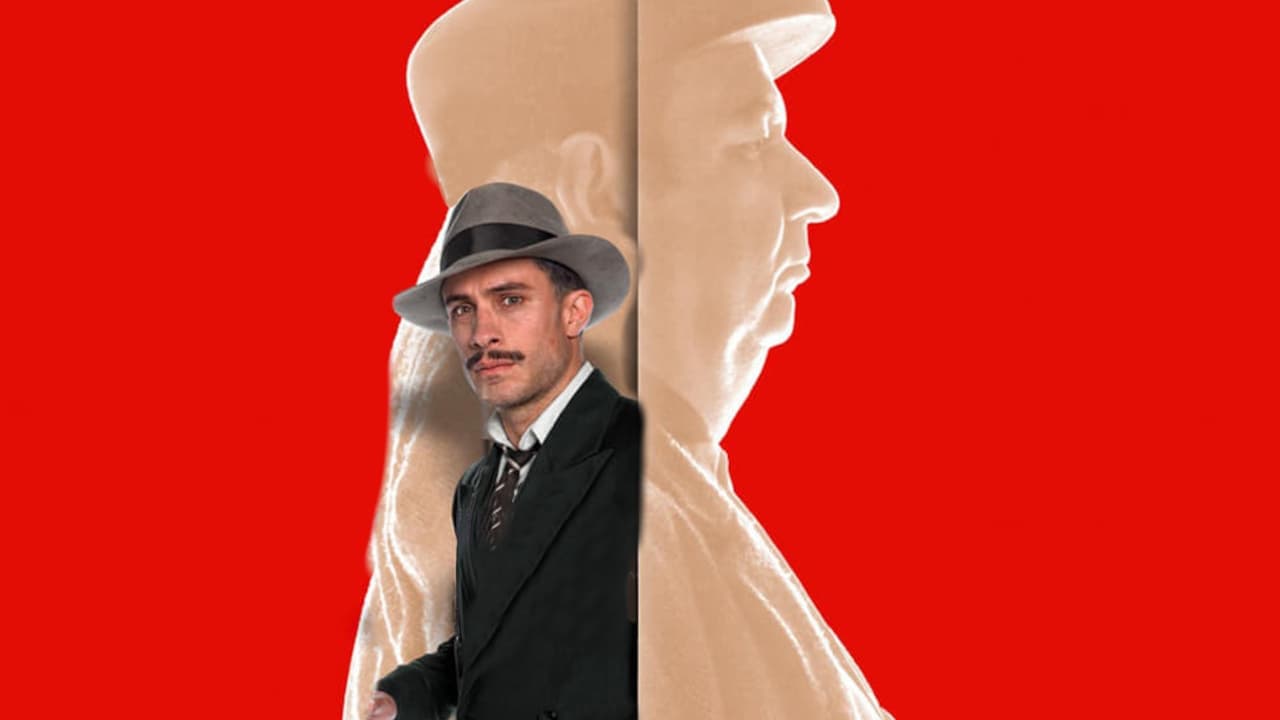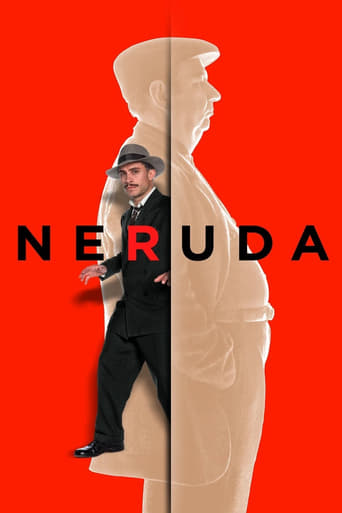

Pablo Larraín's biopic about Chilean Nobel-winning poet, diplomat and politician Pablo Neruda (1904-1973) (Gnecco), revolves around his at-large cat-and-mouse game with a relentless but allegedly made-up police officer Oscar Peluchonneau (Bernal) closely tailing him during the persecution of Communists issued by the Janus-faced President Gabriel González Videla (Castro) in 1948. Right out of the box, Larraín archly lays bare his derogative slant toward Videla's government by showing a then-Senator Neruda wrangle with others in the Parliament's resplendent bathroom, before lends him a rodomontading stage of poem recitation during a private gathering, and later doesn't hold back in sending him into a brothel for debauchery, further on, venting barbs to his loyal helpmate Delia del Carril (an age-defying Morán), whom he must leave behind in the third act when heading to the Andes mountains where he will secretly escape to Argentina on horseback. On balance, Larraín's view of Neruda is a solid composite of varying complexities, a larger-than-life character exuding a ghost of mystique, also on the strength of Luis Gnecco's fine performance.But essentially the film is a meta-fictional dyad of Neruda and Oscar, it is the latter's self-inspecting voice-over traverses the entire running time and whose inexorable pursuance is futile in foresight but, by virtue of Larraín's curve-ball construct of obfuscating the boundary between fiction and non-fiction, Oscar's quest of finding his identity (by the time of the third act, the predator-and-prey pursuit is saliently evolved into a poetic voyage), in fact strikes a more affecting chord with audience by being sublimated into a sort of existential mulling over an individual's congenital frailty: blindly overreaching oneself to compensate for (mostly self-induced) one's deficiency in self-esteem. Gael García Bernal effectively engineers Oscar's painful self-sacrifice with an almost pilgrim-like piety and gravitas. On the one hand, Larraín's innovative deconstruction-inflected modus operandi brings a wheeze of freshness in the time-worn biopic genre (so is his JACKIE 2016), but on the other hand, it is still an inchoate approach that overly relies on a director's artistic propensity, in this instance, the whole package of NERUDA's saturated, purple-bluish hue, starkly freewheeling camera movement, and a disconcerted accompanying score could not be every cinephile's cuppa, notwithstanding how stimulating it might sound on paper.
... View MoreIn post war Chile, Communist poet Senator Pablo Neruda (Luis Gnecco) enrages the political establishment. He decides to go into hiding as Óscar Peluchonneau (Gael García Bernal) leads a large police dragnet to arrest him. Soon, anti-communist repression takes hold in the country and many are imprisoned.This has too much of an artistic flair. I get the connection with a poet protagonist. I would like to understand the political climate at the beginning. Neruda talks about strikes. It would be helpful to see more of the anti-union brutality. It would set the stage for his initial escape. Not everybody knows the history or even who Augusto Pinochet is. I like the Captain Ahab aspect of Peluchonneau. It would be good to have less artistic flair. I want less literary exposition and more intense thrills. I like the turn as the political roundups take its toll and the darker character descend. There is a more intense take on this story but I'm not completely opposed to this artistic rendering.
... View MoreI agree with "jakob13" in his review of this fascinating movie. But I believe that it warrants more historical perspective, only hinted at in the movie. The influence of the US in enforcing its post-war anti- communist zeal throughout the Americas is mentioned, but not reinforced. The rise of Pinochet (also referenced in passing) is barely revealed. On balance, though, I'm not sure how much this matters, since the thrust of the movie is not historical recreation, but rather, the revelation of those aspects of character and consciousness that guide poet and public, hunter and hunted in extraordinarily threatening times.
... View More"Neruda" is a Chilean Spanish-language film from 2016 directed by Pablo Larraín and written by Guillermo Calderón, not the first collaboration by this duo. It runs for 105 minutes roughly and focuses on the post-WWII years in writer Pablo Neruda's life. Do not be fooled by the title here: This is not a biopic and this is maybe also the film's biggest problem. Of course, you need to use an actor like Gael Garcia Bernal if you have him at your disposal, but he really took away from the film here in terms of quality and with this I am not talking about the performance, but about his character in general. I really would have liked this film to focus exclusively on Neruda, but many times you have a feeling that he just plays second fiddle to GGB's character here. The latter is a police officer in charge of finding Neruda and the longer the film goes, the more mysteriously it all becomes. Is he just a figment of Neruda's imagination? Is he a character from one of Neruda's works? Is he an actual police officer? Is it Neruda himself? There is no definite response to any of these questions. But the occasionally pretentious voice-over coming from Óscar (that's his name) as well as the fact that Bernal is credited first makes obvious that Neruda is just means to the story and his co-lead here, a tool basically, but not the man in charge, even if the police officer's actions are all consequences of Neruda's.I personally would have preferred this film to be entirely about Neruda or at least to keep it a more factual, more thrilling tale of one character ruthlessly chasing the other. More realism would have helped. instead questions arise like why does he not have any officers under him that help him. Why is he always chasing him like a lone wolf? Or why does he seem to die at the end and then magically reappears again. These may all be symbolisms or metaphors, but it's mostly over the top and the link to realistic events gets lost inevitably the longer the film goes. This is a shame as the subject of Neruda could have made for a really great film. From what we see in here, the character is very interesting, as a politician as well as writer. Now we have to wait probably another decade till we get a new Neruda film and maybe that one will be as weak as this one here too. I think the idea of Óscar having doubts about his own worth and how he needs to be an artist too to take down Neruda, not just a supporting player was a really nice one and the entire film and protagonist's inner conflict could have been about this all the time. Instead the script feels lost and lacking focus on more occasions than one. It also shows how little awards recognition Gnecco received for such a baity character that it is all about GGB, even if he didn't receive that much either. I think all the consideration for this film in foreign language categories (also at the Golden Globes) feels very exaggerated. It is Larraín's weaker 2016 film compared to the Oscar-nominated "Jackie" and also compared to "No". I have to give "Neruda" a thumbs-down and say the Academy got it right in not nominating Chile's submission this year, also not including it among the final nine. Not recommended and you can certainly say this is "Catch Me If You Can" gone wrong because it did not try to tell a memorable story, but be way too artistic for its own good.
... View More